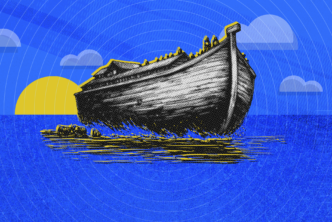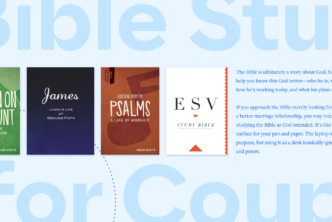The following is a short excerpt from the already short What Is the Bible? by Graham Cole—one of 17 short books on many current topics in the Questions for Restless Minds series, edited by D.A. Carson. In it, Cole describes the way two different men from very different worlds end up entering the same one through the pages of Scripture.
Émile Cailliet
Émile Cailliet was raised in a naturalistic environment in France. In fact, he first saw a Bible at the age of twenty-three. He had a longing though for self-understanding. He expresses that longing in powerful terms when he writes:
During long night watches in the foxholes [in WWI] I had in a strange way been longing—I must say it, however queer it may sound—for a book that would understand me. But I knew of no such book.”1
So what did Cailliet do? He set out to construct one himself: “Now I would in secret prepare one for my own private use.” Over time he constructed his book made up of quotations drawn from literature and philosophy. In the end, however, when he read his compilation he found only disappointment: “It carried no strength of persuasion.” Instead of insight he found emptiness.
Around that same time his wife happened on a Protestant church, went in and met the elderly pastor. As Cailliet relates the story: “She walked to his desk and heard herself say. Have you a Bible in French?” Indeed he did. And Cailliet’s wife upon his return home gave him the copy of the Bible. (How she found this church is an interesting story in itself.) He vividly describes what happened next:
I literally grabbed the book and rushed to my study with it. I opened it and chanced upon the Beatitudes [Matthew 6]: I read, and read.… I could not find words to express my awe and wonder. And suddenly the realization dawned upon me: This was the Book that would understand me! I needed it so much, yet, unaware I had attempted to write my own—in vain.… I continued to read deeply into the night, mostly from the gospels.… A decisive insight flashed through my whole being the following morning as I probed the opening chapters of the gospel according to John. The very clue to the secret of human life was disclosed right there, not stated in the foreboding language of philosophy, but in the common everyday language of human circumstances.
Cailliet went on to become a noted philosopher and Christian thinker.
John Piper
John Piper’s story is different from that of Cailliet. Piper was raised by parents who prized the Bible and sought to live by it. He became a theological educator and eventually an influential author, speaker, and pastor. Over the years his belief in the Bible’s truthfulness was challenged, particularly in graduate school. However, he discovered through experience that it was not so much him holding on to the Bible as an authority in his life but rather he was being held by it.
What held him? How can you be held by a book? Piper explores a number of metaphors in answering the question:
The Bible was never like a masterpiece hanging in a museum that I viewed this way and that. Rather, it was like a window. Or like binoculars. My view of the Bible was always through the Bible. So when I say that, all along the way, my view was getting clearer and brighter and deeper, I mean the reality seen through it was getting clearer and brighter and deeper. Clearer as the edges of things became less fuzzy, and I could see how things fit together rather than just smudging into each other. Brighter as the beauty and impact of the whole message [of the Bible] was more and more attractive. And deeper in the sense of depth perspective—I suppose photographers would say “depth of Field.” Things stretched off into eternity with breathtaking implications—in both directions past and future. You could sum it up with the phrase the glory of God. That’s what I was seeing.2
For Piper, it was the Bible’s vista of reality holding him and not the other way around.
Cailliet and Piper began in very different places. One started as a naturalist and the other was raised in a Christian home environment. Both came to the same place of prizing the book that understood them.
***
This article was originally published in the May/June 2022 issue of Bible Study Magazine. Slight adjustments, such as title and subheadings, may be the addition of an editor.
Related articles
- What’s the Best Evangelism Strategy? Some Wisdom from John Piper
- Almost Home: What the Bible Does (& Doesn’t) Teach Us about Heaven
- How to Discover Your True Identity in Christ
Related resources






